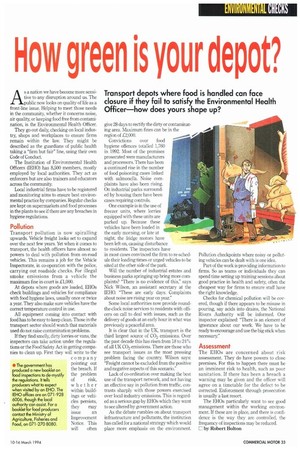Mow green is your depot?
Page 35

If you've noticed an error in this article please click here to report it so we can fix it.
Transport depots where food is handled can face closure if they fail to satisfy the Environmental Health Officer—how does yours shape up?
As a nation we have become more sensitive to any disruption around us. The public now looks on quality of life as a front-line issue. Helping to meet those needs in the community, whether it concerns noise, air quality, or keeping food free from contamination, is the Environmental Health Officer.
They go out daily, checking on local industry, shops and workplaces to ensure firms remain within the law. They might be described as the guardians of public health taking a "firm but fair" line, using their own Code of Conduct.
The Institution of Environmental Health Officers (IEHO) has 8,500 members, mostly employed by local authorities. They act as enforcers but are also trainers and educators across the community Local industrial firms have to be registered and monitoring aims to ensure best environmental practice by companies. Regular checks are kept on supermarkets and food processes in the plants to see if there are any breaches in hygiene regulations.
Pollution
Transport pollution is now spiralling upwards. Vehicle freight looks set to expand over the next few years. Yet when it comes to transport, the health officers have almost no powers to deal with pollution from on-road vehicles. This remains a job for the Vehicle Inspectorate, in co-operation with the police, carrying out roadside checks. For illegal smoke emissions from a vehicle the maximum fine in court is £1,000.
At depots where goods are loaded, EHOs check buildings and vehicles for compliance with food hygiene laws, usually once or twice a year. They also make sure vehicles have the correct temperature control in use.
All equipment coming into contact with food has to be easy to keep clean, Those in the transport sector should watch that materials used do not raise contamination problems.
If they find smelly, dirty lorries or vans, the inspectors can take action under the regulations or the Food Safety Act in getting companies to clean up. First they will write to the company pointing out the breach. If the problem of risk, whether within buildings or vehicles persists, they may issue an Improvement Notice. This will often give 28 days to rectify the dirty or contaminating area. Maximum fines can be in the region of £2,000.
Convictions over food hygiene offences totalled 1,760 in 1992. Most of the premises prosecuted were manufacturers and processors. There has been a continued rise in the number of food poisoning cases linked with salmonella. Noise complaints have also been rising. On industrial parks surrounded by housing there have been cases requiring controls.
One example is in the use of freezer units, where lorries equipped with these units are parked up. Because these vehicles have been loaded in the early morning, or late at night, the fridge motors have been left on, causing disturbance to residents. The inspectors have in most cases convinced the firm to re-schedule their loading times or urged vehicles to be sited at the other side of the park.
Will the number of industrial estates and business parks springing up bring more complaints? "There is no evidence of this," says Nick Wilson, an assistant secretary at the IEHO. "These are early days. Complaints about noise are rising year on year."
Some local authorities now provide roundthe-clock noise services to residents with officers on call to deal with issues, such as the delivery of goods at an early hour in what was previously a peaceful area.
It is clear that in the UK, transport is the third largest source of CO2 emissions. Over the past decade this has risen from 18 to 24% of all UK CO2 emissions. There are those who see transport issues as the most pressing problem facing the country. Wilson says: "Freight cannot be excluded from the positive and negative aspects of this scenario."
Lack of co-ordination over making the best use of the transport network, and not having an effective say in pollution from traffic, contrasts sharply with those powers exercised over local industry emissions. This is regarded as a serious gap by EHOs which they want to see altered by government action.
As the debate rumbles on about transport infrastructure and pollutants, the institution has called for a national strategy which would place more emphasis on the environment. Pollution checkpoints where noisy or polluting vehicles can be dealt with is one idea.
Part of the work is providing information to firms So as teams or individuals they can spend time setting up training sessions about good practice in health and safety, often the cheapest way for firms to ensure staff have the right knowledge.
Checks for chemical pollution will be covered, though if there appears to be misuse in pouring, say acids into drains, the National Rivers Authority will be informed. One inspector explained: "There is an element of ignorance about our work. We have to be ready to encourage and use the big stick when necessary."
Assessment
The EHOs are concerned about risk assessment. They do have powers to close premises. For this to happen there must be an imminent risk to health, such as poor sanitation. If there has been a breach a warning may be given and the officer will agree on a timetable for the defect to be corrected Enforcement through prosecution is usually a last resort.
The EHOs particularly want to see good management within the working environment. If these are in place, and there is confidence is the way they are controlled, the frequency of inspections may be reduced.
E by Robert Bolton




















































































